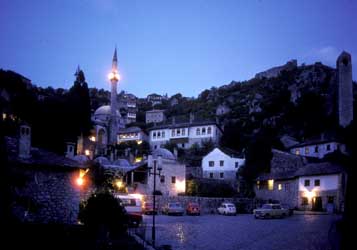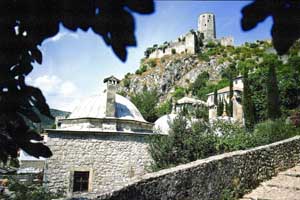Pocitelj
In
1978 I was traveling in what I then called Yugoslavia. I had gone down
the coast to Dubrovnik, which was an impressive walled town but already
discovered by the hordes. Then I was going inland.
 First
stop Pocitelj, an old Turkish market town. Still populated but not very
busy now, and maintained by the government as part of their heritage, with
houses to rent for tourists. Sounded a bit touristy but I was told that
few tourists actually stayed there and it was well worth the visit. I got
on a bus from Dubrovnik, and carefully asked the driver to let me off at
Pocitelj, in case I didn't see it coming. A couple of hours later he did
(and I hadn't). I dumped my bag at the side of an empty country road and
watched the bus drive off, leaving me alone in the middle of nowhere with
no sign of... well, anything. There was a small side road leading off, and
no other option in sight, so I walked down it. Just down the road was Pocitelj:
an absolutely lovely preserved Ottoman hill town, with a cobbled square,
a covered Turkish bazaar, and little stone houses up the hill. An old fort
on top of the hill, and a mosque with a tall, slender minaret completed
the image. The tourist office on the square rented me an apartment in one
of the houses for the night, and I explored the village. Tiny, twisty lanes
and stairs, a view down to the river below, and the mosque overlooking all.
I found that the mosque was still active, in daily use.
First
stop Pocitelj, an old Turkish market town. Still populated but not very
busy now, and maintained by the government as part of their heritage, with
houses to rent for tourists. Sounded a bit touristy but I was told that
few tourists actually stayed there and it was well worth the visit. I got
on a bus from Dubrovnik, and carefully asked the driver to let me off at
Pocitelj, in case I didn't see it coming. A couple of hours later he did
(and I hadn't). I dumped my bag at the side of an empty country road and
watched the bus drive off, leaving me alone in the middle of nowhere with
no sign of... well, anything. There was a small side road leading off, and
no other option in sight, so I walked down it. Just down the road was Pocitelj:
an absolutely lovely preserved Ottoman hill town, with a cobbled square,
a covered Turkish bazaar, and little stone houses up the hill. An old fort
on top of the hill, and a mosque with a tall, slender minaret completed
the image. The tourist office on the square rented me an apartment in one
of the houses for the night, and I explored the village. Tiny, twisty lanes
and stairs, a view down to the river below, and the mosque overlooking all.
I found that the mosque was still active, in daily use. That was my first sight of the secret Muslim corner of Europe: everyone
knows of Bosnia now, but I used to think, like everyone else, that until
you got to Istanbul, Islam was only a visitor. Here the Ottoman empire was
not so long ago: the Turks had gone, within living memory, but everything
that remained belonged to their culture. The same was true in Sarajevo,
up the road in the mountains. There I met a Pakistani who lived in Winnipeg,
Canada, who was travelling just like me. We went for a coffee together.
In Sarajevo they drank coffee the Turkish way: hot as hell, black as death,
and sweet as love. We ordered a sweet pastry with it. Friendly service for
me, but surly compliance for him... he explained: it was Ramadan. The Sarajevans
were muslims, and they knew that he was a muslim too. They could tell just
by looking at him. So they'd happily serve me food, that was my business;
but they didn't approve of him eating in daylight during Ramadan. This was
in Europe! Anyway, these towns soon suffered the fate of so much of Europe
in the twentieth century: their buildings were flattened and their people
killed or driven out, because they didn't fit somebody else's politics.
That was my first sight of the secret Muslim corner of Europe: everyone
knows of Bosnia now, but I used to think, like everyone else, that until
you got to Istanbul, Islam was only a visitor. Here the Ottoman empire was
not so long ago: the Turks had gone, within living memory, but everything
that remained belonged to their culture. The same was true in Sarajevo,
up the road in the mountains. There I met a Pakistani who lived in Winnipeg,
Canada, who was travelling just like me. We went for a coffee together.
In Sarajevo they drank coffee the Turkish way: hot as hell, black as death,
and sweet as love. We ordered a sweet pastry with it. Friendly service for
me, but surly compliance for him... he explained: it was Ramadan. The Sarajevans
were muslims, and they knew that he was a muslim too. They could tell just
by looking at him. So they'd happily serve me food, that was my business;
but they didn't approve of him eating in daylight during Ramadan. This was
in Europe! Anyway, these towns soon suffered the fate of so much of Europe
in the twentieth century: their buildings were flattened and their people
killed or driven out, because they didn't fit somebody else's politics.
 Sarajevo
was shelled so bad to prove that it didn't really belong to the people who
lived there, that it made everybody's TV screens for a long time. It is
possible that some people who lived in Sarajevo then, were already living
in Sarajevo when the Archduke was assassinated and World War 1 started.
It is quite likely that some people in Sarajevo had fought against the Nazis
when they shelled them. They must be getting quite tired of being European
by now. Pocitelj was of no military or political importance, so it was not
attacked early; but it was important psychologically, it seems: after most
of the fighting was over, the Croat forces shot it up, and coldly destroyed
the mosque, dynamiting its minaret, and they blew up the lovely old Turkish
covered market, just so we couldn't enjoy it any more. It wasn't theirs,
so nobody could have it.
Sarajevo
was shelled so bad to prove that it didn't really belong to the people who
lived there, that it made everybody's TV screens for a long time. It is
possible that some people who lived in Sarajevo then, were already living
in Sarajevo when the Archduke was assassinated and World War 1 started.
It is quite likely that some people in Sarajevo had fought against the Nazis
when they shelled them. They must be getting quite tired of being European
by now. Pocitelj was of no military or political importance, so it was not
attacked early; but it was important psychologically, it seems: after most
of the fighting was over, the Croat forces shot it up, and coldly destroyed
the mosque, dynamiting its minaret, and they blew up the lovely old Turkish
covered market, just so we couldn't enjoy it any more. It wasn't theirs,
so nobody could have it.Pocitelj
was a beautifully-preserved Ottoman Turkish town. It had to go, I suppose.
I'm glad I saw it first.